History of Reggae
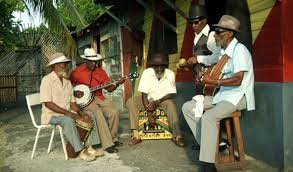 Reggae’s origins are actually shrouded in quite a lot of mystery. We don’t know exactly how it originated, or even why it was named like that. We know that the name Reggae means “ragged”, so we can probably assume that the very first anonymous pioneers of the genre came from lower class households. Early reggae was a combination of Jamaican folk styles such as the traditional Mento and the contemporary Ska, as well as the American Rhythm & Blues and jazz. The latter two were often broadcast on stations across the States due to their growing popularity there, and since Jamaica is located rather close to Florida, the radiowaves could easily reach it. It’s rather important to note that at the time Jamaica was still a British colony still firmly under the Queen’s rule, so perhaps an adoption of styles that were so typical to the American culture could be seen as a peaceful form of protest.
Reggae’s origins are actually shrouded in quite a lot of mystery. We don’t know exactly how it originated, or even why it was named like that. We know that the name Reggae means “ragged”, so we can probably assume that the very first anonymous pioneers of the genre came from lower class households. Early reggae was a combination of Jamaican folk styles such as the traditional Mento and the contemporary Ska, as well as the American Rhythm & Blues and jazz. The latter two were often broadcast on stations across the States due to their growing popularity there, and since Jamaica is located rather close to Florida, the radiowaves could easily reach it. It’s rather important to note that at the time Jamaica was still a British colony still firmly under the Queen’s rule, so perhaps an adoption of styles that were so typical to the American culture could be seen as a peaceful form of protest.
Another peculiar thing we know about the early Reggae artists was that many of them belonged to an interesting religion called Rastafari (as you may have figured out, that’s where the word Rasta comes from). Rastafarians worshipped the emperor of Ethiopia as the Messiah and preached a return to Africa for Jamaican people. Africa and its various cultures obviously were a great influence to Rastafarians, who subtly incorporated several African musical styles into Reggae, giving it the modern sound that we all know and love. Rastafari also affected the lyrics of the songs, which, in the genre’s early days, used to be about typical concepts for music such as love and peace. Rastafarians, though, often sang about socio-political and religious themes. They praised Jah (God) and stood against the oppressions and injustices perpetrated by Babylon (the West). The lyrics, while nigh-incomprehensible to English speakers, often inspired young Jamaicans to participate in activities commonly associated with the Rastafari religion, such as smoking Ganja, or marijuana (which was used as a sacrament). Rastafarians believed that smoking cannabis brought them closer to Jah, but once their songs became popular in the late 60s and early 70s their lyrics were often misinterpreted as an excuse to get high. This misconception gave birth to the “high Jamaican” stereotype character that is often depicted on T-shirts and figurines.
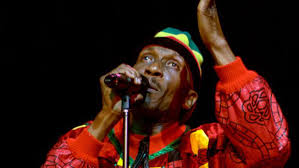 Throughout the 60s, reggae began slowly spreading throughout Jamaica, eventually leaving it and spreading to the UK and US, especially after Jamaica’s independence in 1962. In 1967, Prince Buster’s song “Al Capone” started a short dance craze in the UK, which brought reggae into the public eye in the country and gave birth to several non-Jamaican artists and bands who dipped their toes into the genre. For a time, reggae was associated with gangs and violence in the country, not unlike how hip-hop and rap are associated with it in the US today. It wasn’t until the release of Jimmy Cliff’s “Wonderful World Beautiful People” in the late 60s, which came back to reggae’s origins of love and peace (rather than the Rasta propaganda that had become popular with many reggae artists at the time) that managed to present reggae in a different light.
Throughout the 60s, reggae began slowly spreading throughout Jamaica, eventually leaving it and spreading to the UK and US, especially after Jamaica’s independence in 1962. In 1967, Prince Buster’s song “Al Capone” started a short dance craze in the UK, which brought reggae into the public eye in the country and gave birth to several non-Jamaican artists and bands who dipped their toes into the genre. For a time, reggae was associated with gangs and violence in the country, not unlike how hip-hop and rap are associated with it in the US today. It wasn’t until the release of Jimmy Cliff’s “Wonderful World Beautiful People” in the late 60s, which came back to reggae’s origins of love and peace (rather than the Rasta propaganda that had become popular with many reggae artists at the time) that managed to present reggae in a different light.
In the States, reggae first found mainstream popularity in the most unlikeliest of places – cinema. We’ve often stressed the importance of movies and other mainstream media as ambassadors for different cultures and styles, both on this site and in real life. A popular movie or videogame can introduce hundreds of people to new things that they may not have known about, but could easily fall in love with. “Avatar: The Last Airbender” introduced a whole generation to Buddhism and Eastern teachings, “Hotline Miami” showed many that 80s disco could still sound great today, and musicals such as “Les Miserables” gave people a new appreciation for musical theatre. Similarly, 1972’s “The Harder They Come”, which tells the story of a young man trying to survive the harsh Jamaican life on the streets by selling marijuana, had a soundtrack that consisted of nothing but reggae. The movie became an enormous success, being cited by film critic Barbara Mennel as “possibly the most influential of Jamaican films”. Needless to say, it was what brought reggae into the public perception in the 70s, and it hasn’t left since.
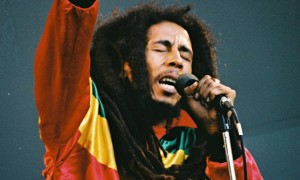 We can’t talk about reggae without mentioning Bob Marley, one of, if not the, most influential and popular reggae performers of all time. His face has been on almost anything, from T-shirts to soft drink cans (I’m not making this up, I’ve drank one myself), and there’s barely anyone who knows anything about music but hasn’t heard of Marley’s name. A devout Rastafarian himself, Marley’s often sang about socio-political topics, which he later backed up with more than songs during his career as a political activist. He and his band The Wailers released some of the very first reggae albums ever, and Eric Clapton’s cover of “I Shot The Sheriff” brought Marley and his music to the attention of the Western world. Despite his early death in 1981 from cancer, to this day Marley remains the face and soul of reggae worldwide. Several of his children, such as Damian Marley, have chosen to follow in their father’s footsteps and create reggae music (Damian’s single “Make It Bun Dem”, for which he collaborates with Skrillex, was featured in the recent videogame “Far Cry 3”).
We can’t talk about reggae without mentioning Bob Marley, one of, if not the, most influential and popular reggae performers of all time. His face has been on almost anything, from T-shirts to soft drink cans (I’m not making this up, I’ve drank one myself), and there’s barely anyone who knows anything about music but hasn’t heard of Marley’s name. A devout Rastafarian himself, Marley’s often sang about socio-political topics, which he later backed up with more than songs during his career as a political activist. He and his band The Wailers released some of the very first reggae albums ever, and Eric Clapton’s cover of “I Shot The Sheriff” brought Marley and his music to the attention of the Western world. Despite his early death in 1981 from cancer, to this day Marley remains the face and soul of reggae worldwide. Several of his children, such as Damian Marley, have chosen to follow in their father’s footsteps and create reggae music (Damian’s single “Make It Bun Dem”, for which he collaborates with Skrillex, was featured in the recent videogame “Far Cry 3”).
Today, reggae sadly isn’t doing too well. It would be a lie to say that there aren’t any active reggae artists right now – in fact, there could be almost as many as there have always been. But the genre’s popularity has dropped significantly since its peak in the 70s, and nowadays most people who even know about it regard it more as a joke than as an actual piece of music history. You’d be hard-pressed to find any media at all using any reggae songs at all (the “Far Cry 3” example above is one of the very few exceptions, and even that track was made with the collaboration of a popular, modern artist and isn’t purely reggae). If this keeps on, reggae might be completely forgotten within the next 50 years, which would be a gigantic loss for the music world considering just how unique this genre is, being a mixture of Jamaican, African and American styles. Still, we’ll all do our best to help keep the genre in the public consciousness, and who knows, maybe eventually it’ll see a renaissance. We can only hope!
September 12, 2015 Jamaican music Read more >


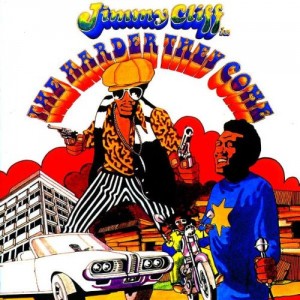 Remember back at the history page where I spoke about a Jamaican movie called “The Harder They Come”? You know, the one whose soundtrack was all reggae and helped jump-start the genre’s popularity in the West almost single-handedly? Well… This album is its soundtrack. And it is MAGNIFICENT! “The Harder They Come” is one of those very rare albums that solidify a genre, giving listeners a taste of just what exactly that kind of music is capable of. While it’s true that Jimmy Cliff has only contributed a couple of tracks to the album that bears his name, almost every single song here is pure gold. I don’t even know what else to say about it – this album made thousands of people fall in love with reggae, and it just might make you fall in love as well!
Remember back at the history page where I spoke about a Jamaican movie called “The Harder They Come”? You know, the one whose soundtrack was all reggae and helped jump-start the genre’s popularity in the West almost single-handedly? Well… This album is its soundtrack. And it is MAGNIFICENT! “The Harder They Come” is one of those very rare albums that solidify a genre, giving listeners a taste of just what exactly that kind of music is capable of. While it’s true that Jimmy Cliff has only contributed a couple of tracks to the album that bears his name, almost every single song here is pure gold. I don’t even know what else to say about it – this album made thousands of people fall in love with reggae, and it just might make you fall in love as well!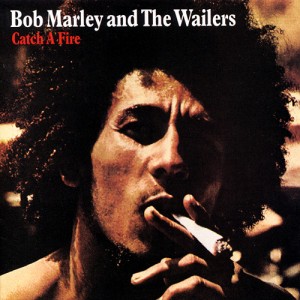 Bob Marley was not a perfect man, not by a long shot. He held some very questionable beliefs (which, indirectly, ended up costing him his life) and engaged in a lot of activities, like a number of affairs (some of which resulted in children) that would have been seriously looked down upon in modern society. Bob Marley was not the highest selling, most prolific or even the most famous reggae artist of his time. And yet, somehow, to this very day he has remained the face of the entire genre, with his likeness adorning numerous products and his music being fondly remembered even by people who don’t know anything about reggae. He has truly turned into a larger-than-life legend, and his albums can truly show us why. Out of all of them, I chose “Catch A Fire” to represent him, as I believe it represents its style flawlessly. It’s also the one with “Stir It Up”, so, y’know. If you haven’t listened to “Stir It Up”, just do yourself a favour and YouTube it right away, alright?
Bob Marley was not a perfect man, not by a long shot. He held some very questionable beliefs (which, indirectly, ended up costing him his life) and engaged in a lot of activities, like a number of affairs (some of which resulted in children) that would have been seriously looked down upon in modern society. Bob Marley was not the highest selling, most prolific or even the most famous reggae artist of his time. And yet, somehow, to this very day he has remained the face of the entire genre, with his likeness adorning numerous products and his music being fondly remembered even by people who don’t know anything about reggae. He has truly turned into a larger-than-life legend, and his albums can truly show us why. Out of all of them, I chose “Catch A Fire” to represent him, as I believe it represents its style flawlessly. It’s also the one with “Stir It Up”, so, y’know. If you haven’t listened to “Stir It Up”, just do yourself a favour and YouTube it right away, alright?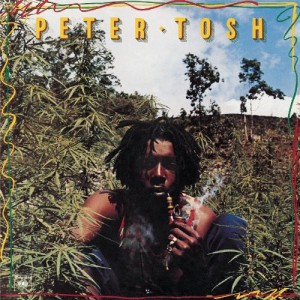 Well, it’s fun to see that weed lovers have been desperately trying to get their favourite recreational drug legalized for at least 40 years now. Peter Tosh, a founding member of The Wailers (Bob Marley’s band) who left the group in ’73 in order to pursue a solo career apparently wanted it legalized so badly that he named a single and his début album after the cause. Despite their controversial themes, the tracks on the album are still very, very solid, and a must-listen for every reggae fan out there. Too bad Peter Tosh seemed to forget that marijuana was not, in fact, legalized yet when he smoked a joint on stage in 1978, which resulted in his arrest and led to a downward spiral which ended his career. Regardless, “Legalize It” represents one of the pioneers of the reggae genre at arguably his finest, which definitely makes it worth a listen.
Well, it’s fun to see that weed lovers have been desperately trying to get their favourite recreational drug legalized for at least 40 years now. Peter Tosh, a founding member of The Wailers (Bob Marley’s band) who left the group in ’73 in order to pursue a solo career apparently wanted it legalized so badly that he named a single and his début album after the cause. Despite their controversial themes, the tracks on the album are still very, very solid, and a must-listen for every reggae fan out there. Too bad Peter Tosh seemed to forget that marijuana was not, in fact, legalized yet when he smoked a joint on stage in 1978, which resulted in his arrest and led to a downward spiral which ended his career. Regardless, “Legalize It” represents one of the pioneers of the reggae genre at arguably his finest, which definitely makes it worth a listen.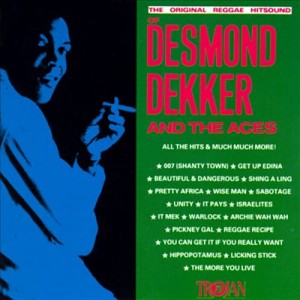 Boy, that’s a mouthful, isn’t it? Bob Marley is widely (and fondly) remembered as THE reggae artist, the man who popularized and perfected the genre, and for most people who just know about reggae from popular culture, he’s the face of the entire genre. However, for people who love reggae and have listened to quite a lot of albums, another name often pops in mind as the person who solidified and perfected it. That name, obviously, is Desmond Dekker. While Dekker didn’t have nearly as many albums as Marley did, he had just as many – if not more – absolutely amazing singles, a good chunk of which are collected in the Hitsound album, which is definitely worth a listen. The coolest thing about it is that it’s not only a fantastic collection for reggae fans, but also a great introduction to beginners, so either way there’s no excuse not to listen to “The Original Reggae Hitsound of Desmond Dekker And The Aces”!
Boy, that’s a mouthful, isn’t it? Bob Marley is widely (and fondly) remembered as THE reggae artist, the man who popularized and perfected the genre, and for most people who just know about reggae from popular culture, he’s the face of the entire genre. However, for people who love reggae and have listened to quite a lot of albums, another name often pops in mind as the person who solidified and perfected it. That name, obviously, is Desmond Dekker. While Dekker didn’t have nearly as many albums as Marley did, he had just as many – if not more – absolutely amazing singles, a good chunk of which are collected in the Hitsound album, which is definitely worth a listen. The coolest thing about it is that it’s not only a fantastic collection for reggae fans, but also a great introduction to beginners, so either way there’s no excuse not to listen to “The Original Reggae Hitsound of Desmond Dekker And The Aces”!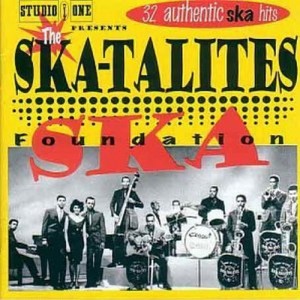 Don’t let the date deceive you – despite being released in 1996, all of the tracks on this album originated in 1963 and 1964. “Skatalites” are just one of numerous bands reggae band that popped up in the early 60s following the genre’s rise to popularity in Jamaica. They only existed for about 14 months, quickly being drowned in the sea of other successful reggae artists without even releasing a single album. They made quite a lot of singles, but they were never collected officially… Until 1996. You see, unlike most reggae bands of the time, which were mostly forgotten, for some reason “Skatalites” endured. Something about the band’s music remained – most likely a little something called “ska”, which is the sound that would remain an integral part of reggae throughout its history. Despite their initial dissolution in 1965, the band found new success and fame after being rediscovered over 20 years later, and they’ve been around ever since. Let’s just say, there’s a perfectly good reason for that.
Don’t let the date deceive you – despite being released in 1996, all of the tracks on this album originated in 1963 and 1964. “Skatalites” are just one of numerous bands reggae band that popped up in the early 60s following the genre’s rise to popularity in Jamaica. They only existed for about 14 months, quickly being drowned in the sea of other successful reggae artists without even releasing a single album. They made quite a lot of singles, but they were never collected officially… Until 1996. You see, unlike most reggae bands of the time, which were mostly forgotten, for some reason “Skatalites” endured. Something about the band’s music remained – most likely a little something called “ska”, which is the sound that would remain an integral part of reggae throughout its history. Despite their initial dissolution in 1965, the band found new success and fame after being rediscovered over 20 years later, and they’ve been around ever since. Let’s just say, there’s a perfectly good reason for that.